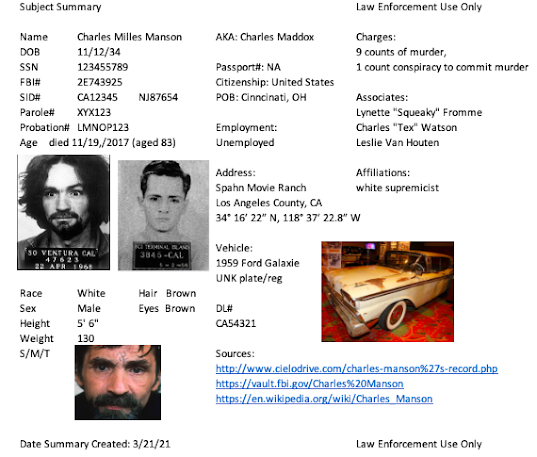Here is a great opportunity for US crime and intelligence analysts! Apply by May 3rd.
https://nij.ojp.gov/funding/nijs-law-enforcement-advancing-data-and-science-civilians-program
"The Law Enforcement Advancing Data and Science (LEADS) Civilians program offers a unique opportunity for law enforcement civilians to partner with LEADS Scholars, Alumni, and Academics in an effort to use data-driven strategies and locally-tailored research to advance their agency’s mission. NIJ is piloting the addition of LEADS Civilians with the goal of strengthening the LEADS programs ability to advance evidence-based policing in the US."
"Eligibility and Expectations
LEADS Civilians must be employed full-time by a law enforcement agency and must have responsibilities relevant to advancing the use of data and integration of research into policies and practices. Such roles include (but are not limited to):
Crime analysts (and intelligence analysts! - my add)
Law enforcement planners
Project managers
Legal analysts
Technology specialists
The LEADS Civilians program acknowledges that all participants are working full-time for a law enforcement agency, and the program is designed to be flexible and dependent on the capacity of the Civilian and the demands of their agency. There are however two meetings LEADS Civilians are expected to attend that require travel away from their agency: the annual IACP Conference, including a pre-conference LEADS meeting and discussion (4-5 days) and the NIJ Summer Session in Washington DC (2-3 days). NIJ covers the cost of all travel and per diem associated with these events.
Program Activities
The LEADS Civilians program is a three-year commitment, and Civilians have the opportunity to participate in a variety of other activities and take advantage of other available resources, including:
Programming at the IACP Annual Conference, beyond the expected participation in the pre-conference meeting and orientation day discussed above, including:
A dedicated LEADS program roundtable with NIJ and IACP leadership to discuss priorities in policing research.
Attendance at and potential participation in the NIJ Saturday Session, "What Works and What Matters in Policing."
Participation in the IACP Research Advisory Committee meeting and the newly formed IACP research section.
Additional training opportunities provided around the LEADS Summer Session, held in and around Washington, DC.
Collaborative brainstorming events between LEADS Scholars, Academics; NIJ science staff; RAND; the Police Executive Research Forum (PERF), and IACP.
Opportunities to present research and findings at law enforcement conferences and be published in practitioner-focused magazines and journals.
Attendance at the annual International Association of Crime Analysts meeting or comparable meeting based on their role in their agency.
Participation in professional development activities hosted by the IACP.
Integration into an on-line community of practice moderated by the IACP connecting both active Scholars and alumni, and acting as a repository for participant information sharing related to research in policing.
Participation in peer review of research applications submitted to NIJ.
Technical assistance on projects (e.g., improving data collection and analysis, integrating existing research into policies and practices, designing research projects) of their own choosing. During their three-year LEADS commitment, civilians may request assistance from the LEADS supporting organizations through IACP’s online community of practice.
LEADS Program participants are also provided with a free PERF membership for the duration of their LEADS scholarship (3 years) and opportunities to attend and participate in PERF conferences.
LEADS Civilians are encouraged to pursue projects that directly respond to the priority needs of their agency. This program does not include direct funding to support original research. However, LEADS Civilians will regularly be exposed to multiple federal resources and programs with relevance to your agency, including such entities as the Bureau of Justice Assistance (BJA) and the Office of Community Oriented Policing Services (COPS Office).
Application Process
Interested applicants must submit the following materials to Apply-To-LEADS@rand.org. In the email subject line please put LEADS CIVILIANS.
Current CV
Letter of support from supervisor (acknowledging the three-year commitment)
Personal essay. Applicants should address the following questions in a 2-page, double-spaced essay (12-pt, times new roman font)
How have you advanced the use of data and research at your agency?
Why do you want to participate in this program?
How will your participation benefit your agency?
What innovative projects involving the use of data and research would you like to pursue, and how might partnering with LEADS Scholars, Academics or other Civilians advance that project?
All applications must be received by May 3, 2021, 11:59 pm ET."

